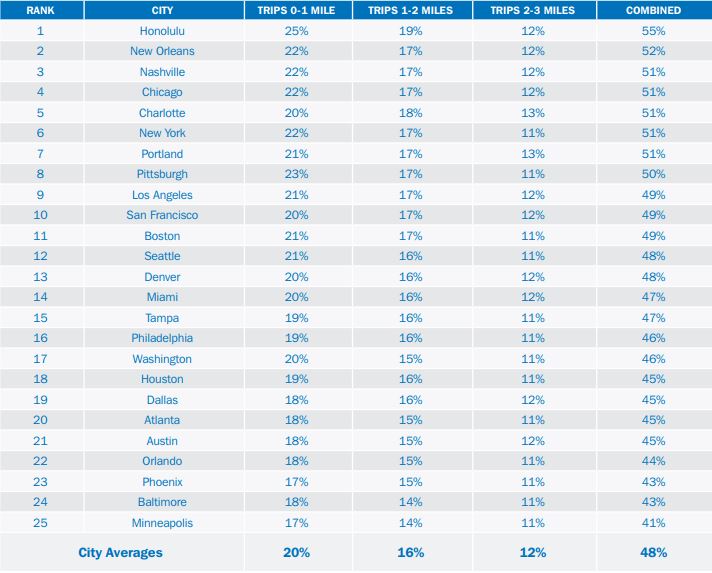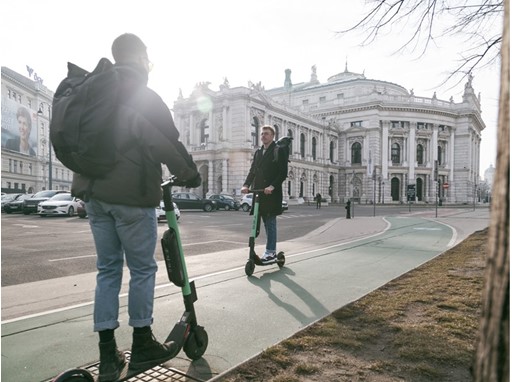Micromobility could replace 50% of car trips in US & UK cities
A new report by INRIX Research has revealed an average 48% of car trips in 25 US cities could be replaced by micromobility solutions, while this figure rises to 67% of car trips in five UK cities.
INRIX analysed trillions of data points from hundreds of millions of connected devices to rank the top 25 US, top five UK and top five German cities with the most potential for micromobility services. The data was based on the proportion of existing vehicles trips three miles or less, based upon the National Association of City Transportation Officials trip distance estimates.
US analysis
Analysis of more than 50 million car trips taken in 25 of the most congested US metro areas during October 2018, revealed that 48% of these trips were less than three miles. Delving deeper, 20% of these trips were less than one mile; replacing even a fraction of these journeys with micromobility trips could see real benefits for US cities.
Micromobility seems to be gaining some momentum in the US, after the North American Bikeshare Association (NABSA) applauded a new bill introduced in March this year, which promotes multi-modal commuting by reinstating and modifying the Bicycle Commuter Tax Benefit.
 According to INRIX, Honolulu, New Orleans and Nashville present the greatest profile for micromobility options to succeed, in part due to their temperate climates and minimal topographic variation.
According to INRIX, Honolulu, New Orleans and Nashville present the greatest profile for micromobility options to succeed, in part due to their temperate climates and minimal topographic variation.
Despite car-centric cities like Phoenix and Dallas having a lower proportion of very short distance trips (17% and 18% respectively) compared to denser cities like Chicago or New York (both 22%), they still have suitably-sized markets for micro-mobility, according to the research firm.
The report suggests that congestion tolling and the continued expansion of the protected cycle network in New York City shows shared micromobility services could safely provide critical first and last-mile connections to different neighbourhoods throughout the city.
A rise in e-scooters and other forms of e-mobility are also growing in prevalence across such cities; CI.N recently discussed the risk and opportunity associated with these new mobility forms for the cycle industry. The Consumer Electronics Show (CES) in Las Vegas will this year commit to a 60,000 square foot area dedicated specifically to eMobility, as part of its extended Smart Cities and Transportation initiatives.
UK analysis
INRIX analysed over 30 million car trips in the UK, revealing a far higher proportion of short-distance vehicle trips compared to cities in the US. This is down to a higher-density population and shorter distances between destinations, making UK cities more appealing for micromobility solutions to replace cars.
The study recorded short trip figures for London, Manchester Birmingham, Glasgow and Sheffield, and revealed that 18% of these trips were less than one mile, while 39% of these trips were between one and two miles. In total, 19% more vehicle trips in the UK are less than three miles, compared to the US.

Bike share schemes are becoming increasingly common in UK cities, with the likes of Uber, Beryl, freebike, ConnectBike and nextbike expanding their services across the UK. Cardiff’s nextbike scheme is set to double this year, while Beryl Bikes has popped up in the City of London, Hereford and Bournemouth and Poole. Uber delved into the UK’s bike share market earlier this year after launching its pilot scheme in London.
Micromobility was also a key theme at this year’s Eurobike trade show, alongside e-Bikes, urban mobility, and digitalisation, and alongside this report highlights a growing shift towards e-mobility and alternative transport forms across the industry.
The full report can be requested here.



